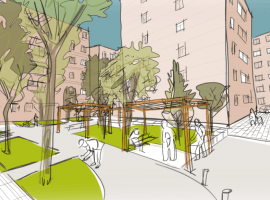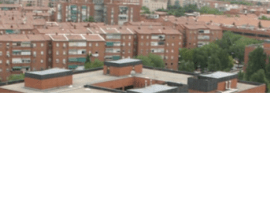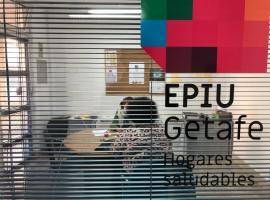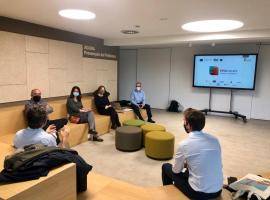Innovation on public procurement at local level

During EPIU project, procurement processes have brought many learnings. The following interview tries to compile this experience.
Interview with Fernando González, Architect in EPIU. EMSV, Getafe
The EPIU project has strategically leveraged public procurement mechanisms at various junctures. Can you pinpoint the specific stages of the project and the intended purposes for which these mechanisms were employed?
Within the consortium, a shared commitment to innovation has prompted the engagement of specialized services. This strategic decision aimed to equip us with the essential means and resources required for the successful execution of project activities.
Among the participating partners, only two entities hold the status of contracting authorities: Getafe City Council and Getafe Municipal Land and Housing Company (Empresa Municipal del Suelo y la Vivienda de Getafe). While there are subtle distinctions between them, both entities adhere to the rigorous standards outlined in the Public Sector Contracts Act.
The initiation of these contracts, along with their preceding tender processes, predominantly occurred in the latter half of the project. Remarkably, these contracts featured prominently in Work Packages 6 and 8, constituting the segments with the highest budget allocations.
From the project's inception, the team recognized that adherence to the Legal Framework for Public Sector Contracts (LCSP), with its stringent requirements, presented distinct advantages. These advantages, notably in terms of publicity, transparency, and fostering business competition, were considered foundational principles guiding our approach to public procurement throughout the project lifecycle.
What challenges have emerged during the process, and how were they effectively addressed?
While an initial set of contracts was meticulously planned and deemed optimal, the dynamic nature of the project necessitated ongoing adjustments to priorities. At times, the emphasis shifted towards procedures that more effectively catered to the evolving needs of EPIU.
Throughout this iterative process, we seized the opportunity to engage a diverse array of contracts and calls for proposals, delving deeply into their nuances to discern both strengths and weaknesses. This exploration has proven invaluable, extracting pivotal lessons that contribute to the formulation of a comprehensive and adaptive implementation strategy.
A diverse array of works and services is encompassed within the EPIU framework. What types of administrative procedures have been implemented to navigate this complexity?
Various categories of contracts have been explored, including service, supply, and works contracts. Additionally, mixed contracts, combining Services and Works or Supply and Installation, along with Framework Contracts and based contracts, have been competitively tendered.
In the execution of these contracts, an assortment of administrative procedures has been applied. Depending on the monetary value involved, different procedures were employed, some of which voluntarily incorporated requirements beyond those mandated by the Legal Framework for Public Sector Contracts (LCSP). These supplementary measures, in alignment with UIA Guidelines, were assimilated to further bolster transparency, competition, and proportionality in the procurement processes.
Have innovative elements been incorporated into the project's procurement procedures, and what has been the experiential outcome?
In many domains, innovation is not just desirable but actively welcomed. Unfortunately, the construction sector typically doesn't fall into this category. The bulk of the budget is allocated to construction works, necessitating a strategic approach to harness the generated learning. However, the construction sector is characterized by inherent inertia, and any deviation from the conventional path requires a transformation of uncertainties into confidence among construction companies. The demands of an experimentation and research project often diverge significantly from those of traditional construction works, both in terms of timelines and dynamics.
Despite these challenges, avenues for innovation were explored through the implementation of two open procurement procedures, a departure from the norm in local administration. These initiatives arose amid an energy crisis compounded by prior challenges in material availability and professional training. The administration, grappling with a significant percentage of abandoned procedures leading to delays and increased costs, prompted a proactive response from EPIU.
Recognizing this context, EPIU designed procedures aligning with the recent updates to the Legal Framework for Public Sector Contracts (LCSP), emphasizing the importance of factors beyond mere economic considerations. These innovative approaches proposed a minimum contract objective, with a distribution of points that elevated non-economic aspects, prioritizing the execution period and predefined improvements in the quality and scope of the work. These criteria carried substantial weight in the overall evaluation, thus influencing the contract award decision.
The experiential outcome proved bittersweet. The complexity of the first tender resulted in its abandonment, leading to a second iteration where the contract was successfully awarded. To mitigate the impact of the tender repetition, the interventions were scaled down to align with the available timeframe. However, this setback yielded valuable feedback from bidding companies, informing future procedural enhancements.
What insights from the EPIU project could prove valuable for other innovative public procurement initiatives?
The EPIU project is grounded in three fundamental concepts: "Understand," "Serve," and "Act." While these principles are inherently tied to the project's social dimension—seeking to comprehend citizens' needs, serve project beneficiaries, and enact concrete actions that optimize resource utilization—they are equally applicable and crucial within the realm of procurement.
Firstly, understanding that the market landscape is no longer as predictable as before is imperative. A nuanced understanding of the tendering process is essential, enabling precise and optimal procurement practices, aligning with current market dynamics.
Secondly, attention should be directed towards companies, particularly those well-suited for medium or small-scale projects. Often lacking the administrative and legal infrastructure of larger construction firms, these companies require careful consideration of procedural intricacies. Procurement processes should be tailored to their specific needs, emphasizing clarity and efficiency over complexity.
Lastly, proactive and legally sound actions are paramount. Ensuring that the tendered projects can be successfully executed by all stakeholders involved is crucial. While strict adherence to legal requirements is fundamental, the relationship between companies and the administration should also be mutually beneficial. This entails covering costs adequately and facilitating fair profits, fostering an environment where companies can sustain operations in an uncertain future. The commitment to legal compliance should be matched by a commitment to supporting and empowering the entities engaging with the administration.
If given the opportunity to embark on the project anew, would you adopt a different approach to public procurement procedures?
The invaluable guidance provided by high-level professionals in crafting meticulous, high-quality, and demanding documents has been instrumental in our evolution as a forward-thinking administration in the 21st century. Their expertise has been pivotal in shaping our decisions throughout the project, influencing the selection of alternatives at critical junctures.
These professionals, well-versed in regulation, regulatory compliance, and European public procurement, collaborated seamlessly with the City Council's specialists, comprehensively grasping the intricacies of the project. Their decisions consistently proved judicious and well-suited to the project's objectives.
Reflecting on this experience, if we were to initiate the project anew, we would seek to engage these professionals from the beginning of the project. While the solutions arrived at might align with our current approach, the early involvement of these experts would afford us the opportunity to share and discuss our ideas with other organizations. This collaborative approach is particularly pertinent as we transition into the phases of transferability and replicability post the conclusion of the EPIU Healthy Homes project.

























